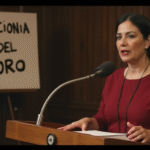Background on the Author and Relevance
The author, writing under the pseudonym “Pendiente Resbaladiza,” has previously expressed concerns about hasty legislative processes leading to legal chaos. In an article titled “The Imminent Legislative Crisis,” the author highlighted multiple errors in legislative technique, including internal contradictions, violations of international treaties, and failure to subordinate laws to the Constitution. The super-majority of Morena assured that these errors would be corrected in secondary laws.
Recent Developments and Issues
In preparation for the discussion and approval of secondary legislation in telecommunications, the author outlined key issues the new legal framework should address, such as rescuing and strengthening asymmetric regulation and addressing the imbalance in regulating television services versus digital platforms, which restricts freedom of expression.
However, the author was unprepared for the display of ignorance and autocracy presented in the new Telecommunications and Broadcasting Matters Act proposal. The act established a concerning censorship regime, riddled with errors, inconsistencies, and legislative oversights that would directly lead to its unconstitutionality and inapplicability once legal challenges were initiated.
Censorship Concerns
The proposal allowed authorities to block digital platforms and conditioned the transmission of all paid content from foreign entities on government approval, among other excessive official controls. The drafters of the decree ensured that violations of freedom of expression were absolute, crude, and obvious, allowing any internet user to verify them by reading just one or two articles of the law.
Legislative Technique Deficiencies
The proposal challenged fundamental notions of the Mexican legal system. The new law’s transitional articles ordered the constitutional reform’s implementation and set a 31-day deadline, contradicting the Constitution’s own 180-day period. This would make the Constitution’s validity contingent on secondary legislation, contrary to its established hierarchy.
Additionally, the reform proposal to the Federal Economic Competition Law, intended to complement anti-monopoly regulation in telecommunications, also included a transitional article activating the constitutional reform’s validity. However, this new deadline depended on when the National Antimonopoly Commission Plenum was formed, no later than June 30, 2025.
Key Questions and Answers
- What are the main issues with the new Telecommunications and Broadcasting Matters Act? The act establishes a concerning censorship regime, allowing authorities to block digital platforms and conditioning foreign content transmission on government approval. It also contains legislative errors, inconsistencies, and oversights that could render it unconstitutional.
- How does the proposed legislation contradict the Constitution? The proposal’s transitional articles order the constitutional reform’s implementation with a 31-day deadline, contradicting the Constitution’s own 180-day period. This would make the Constitution’s validity contingent on secondary legislation, contrary to its established hierarchy.
- What are the implications of these legislative deficiencies? If not corrected, these flaws could impede the application and viability of these laws, at least for those who file proper legal challenges with appropriate arguments.






